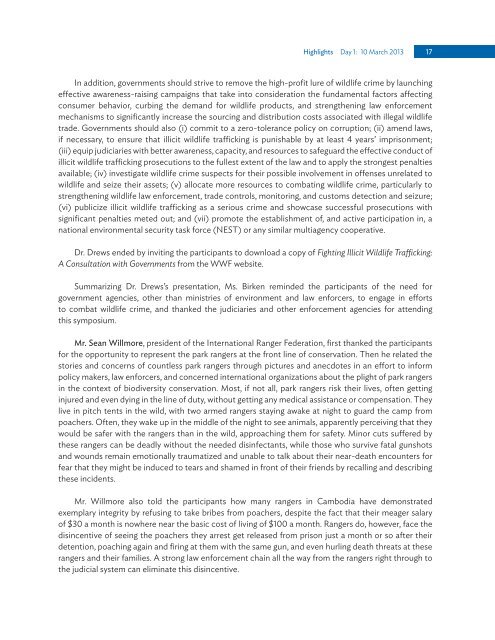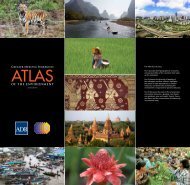ETEE7
ETEE7
ETEE7
Create successful ePaper yourself
Turn your PDF publications into a flip-book with our unique Google optimized e-Paper software.
Highlights Day 1: 10 March 2013 17<br />
In addition, governments should strive to remove the high-profit lure of wildlife crime by launching<br />
effective awareness-raising campaigns that take into consideration the fundamental factors affecting<br />
consumer behavior, curbing the demand for wildlife products, and strengthening law enforcement<br />
mechanisms to significantly increase the sourcing and distribution costs associated with illegal wildlife<br />
trade. Governments should also (i) commit to a zero-tolerance policy on corruption; (ii) amend laws,<br />
if necessary, to ensure that illicit wildlife trafficking is punishable by at least 4 years’ imprisonment;<br />
(iii) equip judiciaries with better awareness, capacity, and resources to safeguard the effective conduct of<br />
illicit wildlife trafficking prosecutions to the fullest extent of the law and to apply the strongest penalties<br />
available; (iv) investigate wildlife crime suspects for their possible involvement in offenses unrelated to<br />
wildlife and seize their assets; (v) allocate more resources to combating wildlife crime, particularly to<br />
strengthening wildlife law enforcement, trade controls, monitoring, and customs detection and seizure;<br />
(vi) publicize illicit wildlife trafficking as a serious crime and showcase successful prosecutions with<br />
significant penalties meted out; and (vii) promote the establishment of, and active participation in, a<br />
national environmental security task force (NEST) or any similar multiagency cooperative.<br />
Dr. Drews ended by inviting the participants to download a copy of Fighting Illicit Wildlife Trafficking:<br />
A Consultation with Governments from the WWF website.<br />
Summarizing Dr. Drews’s presentation, Ms. Birken reminded the participants of the need for<br />
government agencies, other than ministries of environment and law enforcers, to engage in efforts<br />
to combat wildlife crime, and thanked the judiciaries and other enforcement agencies for attending<br />
this symposium.<br />
Mr. Sean Willmore, president of the International Ranger Federation, first thanked the participants<br />
for the opportunity to represent the park rangers at the front line of conservation. Then he related the<br />
stories and concerns of countless park rangers through pictures and anecdotes in an effort to inform<br />
policy makers, law enforcers, and concerned international organizations about the plight of park rangers<br />
in the context of biodiversity conservation. Most, if not all, park rangers risk their lives, often getting<br />
injured and even dying in the line of duty, without getting any medical assistance or compensation. They<br />
live in pitch tents in the wild, with two armed rangers staying awake at night to guard the camp from<br />
poachers. Often, they wake up in the middle of the night to see animals, apparently perceiving that they<br />
would be safer with the rangers than in the wild, approaching them for safety. Minor cuts suffered by<br />
these rangers can be deadly without the needed disinfectants, while those who survive fatal gunshots<br />
and wounds remain emotionally traumatized and unable to talk about their near-death encounters for<br />
fear that they might be induced to tears and shamed in front of their friends by recalling and describing<br />
these incidents.<br />
Mr. Willmore also told the participants how many rangers in Cambodia have demonstrated<br />
exemplary integrity by refusing to take bribes from poachers, despite the fact that their meager salary<br />
of $30 a month is nowhere near the basic cost of living of $100 a month. Rangers do, however, face the<br />
disincentive of seeing the poachers they arrest get released from prison just a month or so after their<br />
detention, poaching again and firing at them with the same gun, and even hurling death threats at these<br />
rangers and their families. A strong law enforcement chain all the way from the rangers right through to<br />
the judicial system can eliminate this disincentive.





